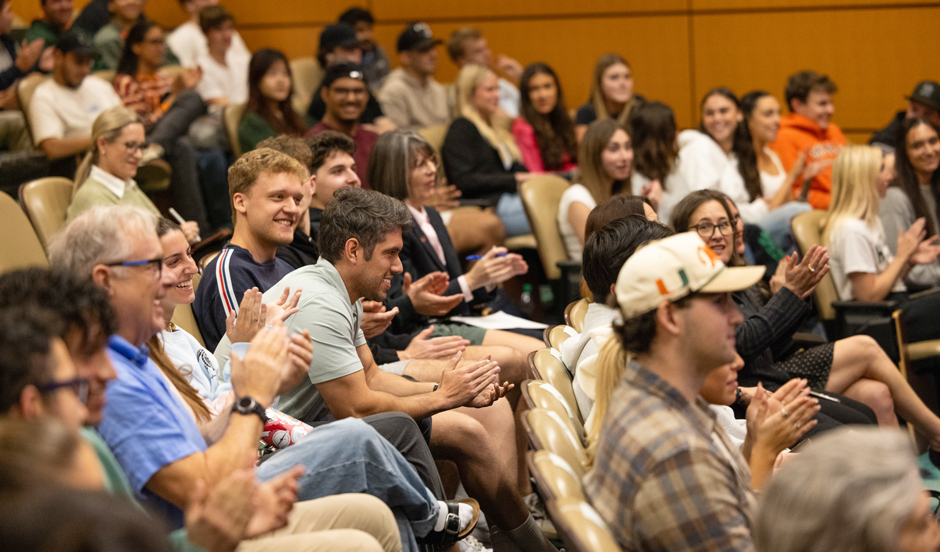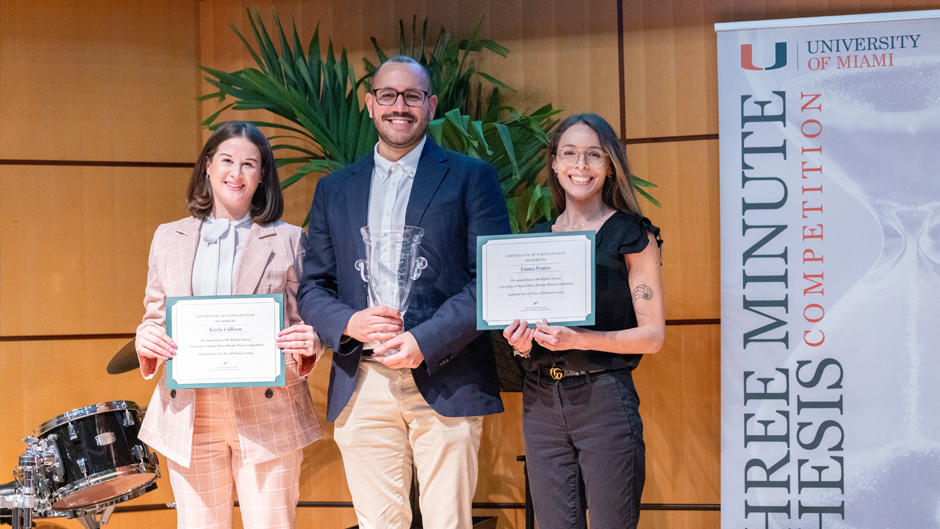New ways to understand two types of cancer that could help improve future treatments. An intervention to destigmatize mental health care among Muslim Americans. And new evidence to help scientists understand which corals may be best equipped to weather the impacts of warming oceans.
These were just a few of the dissertation projects described in lightning-fast presentations at the Eighth Annual Three Minute Thesis Competition Thursday evening, hosted by the Graduate School at the University of Miami. Patricia Abril, interim dean of the Graduate School, opened the event and called it “a TED Talk meets ‘Shark Tank,’” focused on research.
“This event really makes you appreciate the diversity and relevance and importance of graduate education and research here at the University of Miami,” said Abril, who is also professor and chair of the Department of Business Law at the Miami Herbert Business School.
The annual tradition showcased seven students this year from different doctoral programs, each presenting their research at Storer Auditorium in the Miami Herbert Business School. Selected a little over a month ago, the students were asked to memorize their presentations—distilling years of work into just three minutes and using just one PowerPoint slide.

This year, Christian McDonald, a fifth-year doctoral student in Microbiology and Immunology at the Miller School of Medicine, edged out the other students as the winner.
“It’s surreal, and I definitely was not expecting this because there were a lot of incredible presentations by everyone, but I am very happy,” said McDonald, whose advisers are associate professor Noula Dattu Shembade and professor Enrique Mesri, who passed away in 2022.
McDonald is studying one type of herpesvirus that can lead to cancer called Kaposi’s Sarcoma (KSHV) and learned that certain proteins help the virus replicate. His work uncovered that genetically silencing these proteins can prevent cells from developing specific cancer properties during infection.
“Our findings identify a possible new drug target, protein 5B, which can block KSHV replication, prevent cancerous changes to our cells, and in the long term, we hope to help those afflicted with Kaposi’s Sarcoma,” McDonald said.
McDonald will go on to participate in a statewide competition.
The runner up was Emma Pontes, a doctoral student and double alumna in marine biology and ecology from the Rosenstiel School of Marine, Atmospheric, and Earth Science. Pontes is researching the rate at which different coral species respond to low oxygen levels in the water, one of the many impacts of climate change. By examining six local coral species, Pontes learned that each responds very differently to this low oxygen—called hypoxia—and therefore conservation guidelines may need to be revised to reflect the actual implications of low oxygen levels in the ocean.
“Redefining hypoxia thresholds based on species-specific responses will better inform conservation efforts and enhance our prospects for saving these vital ecosystems,” Pontes said.
The People’s Choice Award went to Kaylie Cullison, an M.D./Ph.D. student at the Miller School of Medicine in their Medical Scientist Training Program, and a fourth-year doctoral student in biomedical engineering at the College of Engineering. Cullison is studying glioblastoma, the most common type of brain cancer. Using artificial intelligence and a novel combined MRI and radiation therapy device, Cullison found a way to analyze the tumors—which have an average survival rate of 18 months—deciding much earlier than current methods on which patients could benefit from more aggressive treatment strategies.
“If I knew I had terminal cancer, how I decided to spend the rest of my life would change pretty drastically with the knowledge that I had less than a year to live, versus three years,” said Cullison, who hopes to become a radiation oncologist. “If you’re like me, you’d also want to know that information. My project is developing the tools to give people that choice.”
Among the other contestants were:
Salman Ahmad, a doctoral student in clinical psychology at the College of Arts and Sciences, who discovered that the mental health of Muslim Americans is suffering dramatically. Rates of suicide among this population are two times higher than other faith groups, he said, yet there remains a strong stigma about seeking mental health services that discourages Muslims from seeking care. To counteract these harmful trends, Ahmad created a three-hour, discussion-based mental health workshop that he is delivering to communities around Florida.
“Our findings suggest this workshop reduced stigma, helped attendees feel a greater sense of compatibility between Islam and seeking mental health care, and provided them greater knowledge about how to recognize a need and find resources … but this is just the beginning,” he said. “My hope is having Islamically-integrated mental health conversations can help Muslims erase the stigma and embrace mental health care.”
Dallas Howard, who is studying music theory and composition in the Frost School of Music, gave the audience a short summary of an orchestral piece he composed called “Bubble Theory.” The project is an immersive experience that allows the audience to explore the idea of visualizing sound, by showing them how different musical frequencies can impact water.
“It’s a multimedia experience based on cymatics—a device to view sound—that helps one understand how much complexity of sound exists in the world,” he said.
Hannah Artman, a doctoral student in the School of Communication, is scrutinizing how Latina/o/x political influencers are leveraging social media platforms to build their own brand, oftentimes spreading misinformation.
And Shiyi Zhang, a doctoral candidate in finance at the Miami Herbert Business School, examined whether racial and ethnic diversity can provide any value to a company. Using a massive database of 16 million employees over 30 years, she learned that while financial returns were hard to quantify, diversity in staff often led to more innovation at businesses, and more valuable patients. It also led employees to report feeling happier and more productive.

